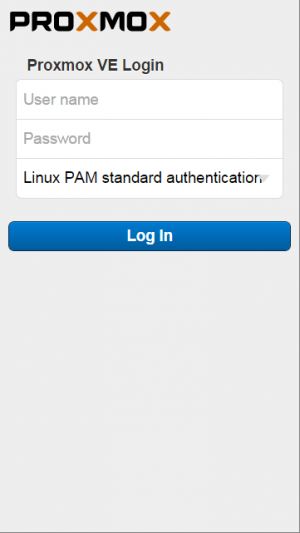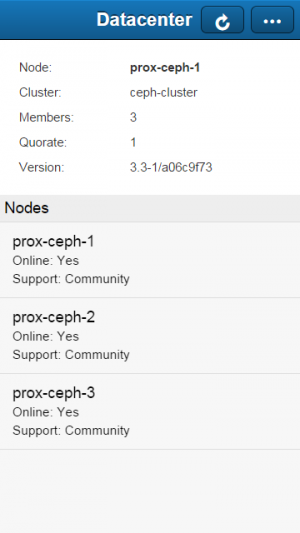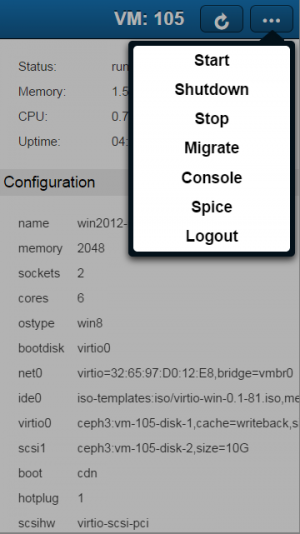Proxmox VE Mobile
Introduction
In addition to the full featured web interface, Proxmox VE Mobile (introduced in Proxmox VE 3.3 as technology preview) is designed specifically for the use on mobile devices (phones and tablets). Its not a complete replacement for the full admin web interface but it has already a lot of key functionality to manage Proxmox VE on the go, including the SPICE and HTML5 console.
Currently VM and CT handling and showing of their configuration (but not its changing) is supported.
As Proxmox VE Mobile is a HTML5 app (build with Sencha Touch), there is no installation or configuration needed.
Main features
- Supports Two-Factor Authentication
- Manage all nodes inside your cluster with one login
- View status and config of host, containers and VM
- Start/Stop/Shutdown/Migrate
- HTML5 Console (works on all browsers)
- SPICE Console, for best user experience (Android only, third party APP needed)
- Task log
Usage
Just point your browser on your mobile device to the main URL, e.g. https://youripaddress:8006
If the auto-detection works correctly (phone browsers works most times, tablets not always), you will see the mobile interface directly. If not, just add the following to your URL:
- https://youripaddress:8006/?mobile=1
This is also a good way to test the mobile interface via your desktop browser. If your browser can simulate a mobile device screen, this will help to test the application just from your desktop.
If you want to switch to standard view (e.g. in order to change some configuration) specify
- https://youripaddress:8006/?mobile=0
How to control a VM
After connecting to server the Log In form is shown (fig. 1)
- Enter User name and Password into the provided fields
- If necessary select "Proxmox VE authentication server" by activating the pull down menu "Linux PAM standard authentication"
- Select the "Log In" bar
Now you are at "Datacenter" level, all cluster nodes are shown (fig. 2)
- Select the node where the VM is located
Now you are at node level, all VMs in that node are shown
- Select the VM
Now you see all data of the selected VM (fig. 3)
- Select from menu top right what you want to to:
- - Start: starts the VM
- - Shutdown: performs an ACPI shutdown of the VM
- - Stop: stops (power off) of the VM
- - Migrate: migrates the VM to another node (note: after migration the VM disappeared from that node where you were connected to - therefore an error message is shown when try to return to VM - that´s not a fault: the machine belongs now to another node than before)
- - Console: tries to open a HTML5 console
- - Spice: opens a SPICE terminal (see below)
- - Logout: ends the Proxmox session and returns to Log In form
SPICE console
For Android devices (preferred), you can use SPICE to get console access.
In order to get this running, you need to purchase Opaque
Iordan Iordanov (from Undatech) did a great job to get this running.
How to use Opaque on Android
- Purchase and install "Opaque" from Google Play
- Make sure that your VM has a SPICE monitor configured (if not yet configured switch to standard view and change the VM configuration "Hardware" -> "Display" accordingly)
- In web-browser:
- - select the machine
- - activate context menu (top right of VM´s window, see fig. 3)
- - select "Spice" => file with access data will be downloaded (named pve-spice[-n].vv where "n" is a sequence number, starting with 1 if there are more than one file)
- Open a file browser and select the just downloaded file and open it with "Opaque"
Note:
- Each access file can can only be used once - it will immediately be deleted after start of Opaque
- On some devices opaque task has to be cancelled before starting a new session
HTML5 Console
If SPICE is not an option you can use an ordinary VNC client. In this case the VM configuration has to be adapted, look here for details.
Security Consideration
If you want to access Proxmox VE Mobile outside your LAN, you should use VPN and TFA to get maximum security.
VPN
To prevent unauthorized access, you should use a VPN to connect to your Proxmox VE hosts.
Two-Factor Authentication
Use Two-Factor Authentication for secure login procedure. If your phone supports NFC, just use a Yubikey with NFC - easy to use and a quite secure one time password.


